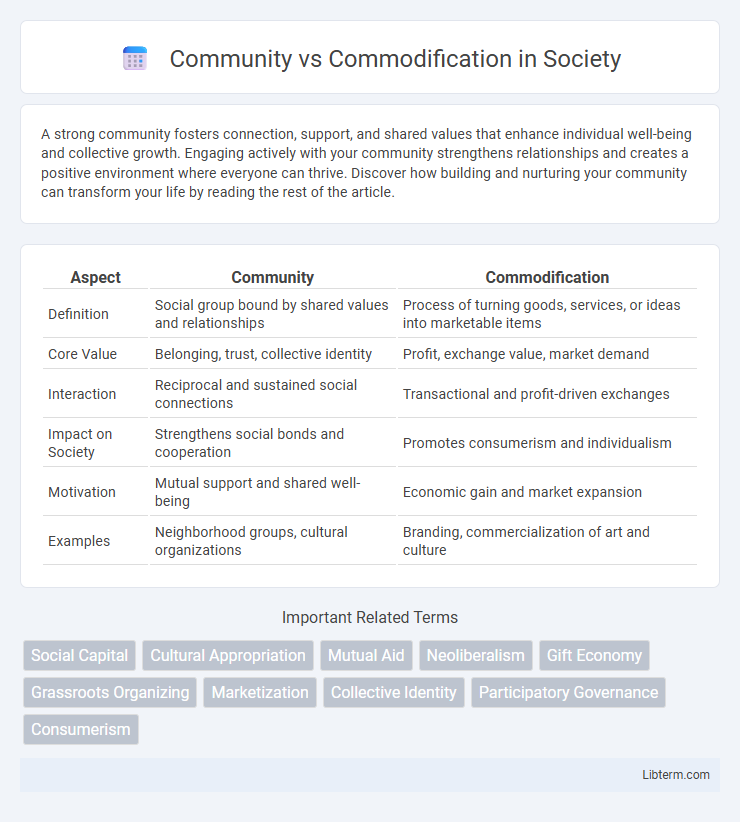A strong community fosters connection, support, and shared values that enhance individual well-being and collective growth. Engaging actively with your community strengthens relationships and creates a positive environment where everyone can thrive. Discover how building and nurturing your community can transform your life by reading the rest of the article.
Table of Comparison
| Aspect | Community | Commodification |
|---|---|---|
| Definition | Social group bound by shared values and relationships | Process of turning goods, services, or ideas into marketable items |
| Core Value | Belonging, trust, collective identity | Profit, exchange value, market demand |
| Interaction | Reciprocal and sustained social connections | Transactional and profit-driven exchanges |
| Impact on Society | Strengthens social bonds and cooperation | Promotes consumerism and individualism |
| Motivation | Mutual support and shared well-being | Economic gain and market expansion |
| Examples | Neighborhood groups, cultural organizations | Branding, commercialization of art and culture |
Understanding Community: Core Values and Principles
Community centers around shared values such as trust, mutual support, and collective well-being, fostering genuine human connections beyond transactional exchanges. Core principles include inclusivity, collaboration, and a sense of belonging that empower individuals to participate actively and contribute to common goals. Understanding these elements highlights how communities prioritize relational bonds over commodification's focus on market-driven interactions and profit.
The Rise of Commodification in Modern Society
The rise of commodification in modern society transforms social relationships and community interactions into market transactions driven by profit. This shift prioritizes consumer behavior, treating cultural values, personal experiences, and social bonds as commodities to be bought and sold. The encroachment of commodification undermines communal solidarity by eroding intrinsic social connections and fostering individualism centered on economic exchange.
How Commodification Impacts Social Relationships
Commodification transforms social relationships into market transactions, reducing personal connections to economic exchanges and diminishing trust and reciprocity within communities. This economic framing prioritizes profit over genuine interaction, leading to alienation and weakening social bonds that traditionally foster mutual support. As a result, community cohesion fractures, and individuals experience increased isolation despite increased accessibility to goods and services.
Community Building vs. Market-Driven Interactions
Community building fosters authentic relationships and shared values among members, emphasizing collaboration and mutual support beyond transactional exchanges. Market-driven interactions prioritize economic incentives, often reducing social connections to commodified exchanges influenced by consumer behavior and competition. This shift from community to commodification challenges the depth of social bonds, impacting trust and long-term engagement.
Shared Resources: Commons or Commodities?
Shared resources, known as commons, are managed collectively by communities, emphasizing equitable access and sustainable usage. When these resources become commodified, they are converted into marketable goods, prioritizing profit over communal benefit. This shift from commons to commodities often leads to restricted access and exploitation, undermining social cohesion and environmental sustainability.
The Role of Technology in Community and Commodification
Technology shapes the dynamics between community and commodification by transforming how people connect, share, and engage within digital spaces. Social media platforms and online forums enable community-building through shared interests and values, yet simultaneously commodify user data and attention as valuable assets for advertisers. This duality highlights technology's role as both a facilitator of authentic social interaction and a mechanism for economic exploitation through commodified digital experiences.
Economic Incentives: Strengthening or Undermining Community?
Economic incentives play a critical role in shaping community dynamics, with commodification often transforming shared cultural and social practices into market-driven activities. This shift can undermine community cohesion by prioritizing individual profit over collective well-being, leading to reduced trust and weakening social bonds. However, when managed thoughtfully, economic incentives have the potential to strengthen communities by funding local initiatives and creating sustainable economic opportunities that align with communal values.
Cultural Shifts: From Collaboration to Competition
Cultural shifts from collaboration to competition highlight a significant transformation in community dynamics, where shared values and collective growth are increasingly replaced by commodification and individual gain. This transition often results in diminishing social trust and weakening communal bonds as relationships become transactional. The emphasis on market-driven interactions prioritizes economic value over cultural connection, reshaping social landscapes into competitive arenas.
Reviving Authentic Communities in a Commodified World
Reviving authentic communities in a commodified world requires prioritizing human connection over transactional exchanges and resisting the pervasive influence of market-driven values. True community fosters shared purpose, mutual support, and cultural continuity, contrasting sharply with the commodification of relationships that reduces interactions to economic transactions. Emphasizing local engagement, collaborative practices, and meaningful participation rebuilds social capital and counters the alienation bred by commodification.
Rethinking Value: People, Products, and Belonging
Rethinking value challenges the traditional commodification model by emphasizing the intrinsic worth of people and their relationships over mere product exchange. Community-based approaches prioritize belonging and shared purpose, fostering social connections that transcend transactional interactions. This shift redefines value as a collective experience, integrating emotional and cultural significance with economic activity.
Community Infographic

 libterm.com
libterm.com